Johan Ferret
Dima
Gemma 3 Technical Report
Mar 25, 2025Abstract:We introduce Gemma 3, a multimodal addition to the Gemma family of lightweight open models, ranging in scale from 1 to 27 billion parameters. This version introduces vision understanding abilities, a wider coverage of languages and longer context - at least 128K tokens. We also change the architecture of the model to reduce the KV-cache memory that tends to explode with long context. This is achieved by increasing the ratio of local to global attention layers, and keeping the span on local attention short. The Gemma 3 models are trained with distillation and achieve superior performance to Gemma 2 for both pre-trained and instruction finetuned versions. In particular, our novel post-training recipe significantly improves the math, chat, instruction-following and multilingual abilities, making Gemma3-4B-IT competitive with Gemma2-27B-IT and Gemma3-27B-IT comparable to Gemini-1.5-Pro across benchmarks. We release all our models to the community.
On Teacher Hacking in Language Model Distillation
Feb 04, 2025



Abstract:Post-training of language models (LMs) increasingly relies on the following two stages: (i) knowledge distillation, where the LM is trained to imitate a larger teacher LM, and (ii) reinforcement learning from human feedback (RLHF), where the LM is aligned by optimizing a reward model. In the second RLHF stage, a well-known challenge is reward hacking, where the LM over-optimizes the reward model. Such phenomenon is in line with Goodhart's law and can lead to degraded performance on the true objective. In this paper, we investigate whether a similar phenomenon, that we call teacher hacking, can occur during knowledge distillation. This could arise because the teacher LM is itself an imperfect approximation of the true distribution. To study this, we propose a controlled experimental setup involving: (i) an oracle LM representing the ground-truth distribution, (ii) a teacher LM distilled from the oracle, and (iii) a student LM distilled from the teacher. Our experiments reveal the following insights. When using a fixed offline dataset for distillation, teacher hacking occurs; moreover, we can detect it by observing when the optimization process deviates from polynomial convergence laws. In contrast, employing online data generation techniques effectively mitigates teacher hacking. More precisely, we identify data diversity as the key factor in preventing hacking. Overall, our findings provide a deeper understanding of the benefits and limitations of distillation for building robust and efficient LMs.
Humanity's Last Exam
Jan 24, 2025Abstract:Benchmarks are important tools for tracking the rapid advancements in large language model (LLM) capabilities. However, benchmarks are not keeping pace in difficulty: LLMs now achieve over 90\% accuracy on popular benchmarks like MMLU, limiting informed measurement of state-of-the-art LLM capabilities. In response, we introduce Humanity's Last Exam (HLE), a multi-modal benchmark at the frontier of human knowledge, designed to be the final closed-ended academic benchmark of its kind with broad subject coverage. HLE consists of 3,000 questions across dozens of subjects, including mathematics, humanities, and the natural sciences. HLE is developed globally by subject-matter experts and consists of multiple-choice and short-answer questions suitable for automated grading. Each question has a known solution that is unambiguous and easily verifiable, but cannot be quickly answered via internet retrieval. State-of-the-art LLMs demonstrate low accuracy and calibration on HLE, highlighting a significant gap between current LLM capabilities and the expert human frontier on closed-ended academic questions. To inform research and policymaking upon a clear understanding of model capabilities, we publicly release HLE at https://lastexam.ai.
Diversity-Rewarded CFG Distillation
Oct 08, 2024Abstract:Generative models are transforming creative domains such as music generation, with inference-time strategies like Classifier-Free Guidance (CFG) playing a crucial role. However, CFG doubles inference cost while limiting originality and diversity across generated contents. In this paper, we introduce diversity-rewarded CFG distillation, a novel finetuning procedure that distills the strengths of CFG while addressing its limitations. Our approach optimises two training objectives: (1) a distillation objective, encouraging the model alone (without CFG) to imitate the CFG-augmented predictions, and (2) an RL objective with a diversity reward, promoting the generation of diverse outputs for a given prompt. By finetuning, we learn model weights with the ability to generate high-quality and diverse outputs, without any inference overhead. This also unlocks the potential of weight-based model merging strategies: by interpolating between the weights of two models (the first focusing on quality, the second on diversity), we can control the quality-diversity trade-off at deployment time, and even further boost performance. We conduct extensive experiments on the MusicLM (Agostinelli et al., 2023) text-to-music generative model, where our approach surpasses CFG in terms of quality-diversity Pareto optimality. According to human evaluators, our finetuned-then-merged model generates samples with higher quality-diversity than the base model augmented with CFG. Explore our generations at https://google-research.github.io/seanet/musiclm/diverse_music/.
Gemma 2: Improving Open Language Models at a Practical Size
Aug 02, 2024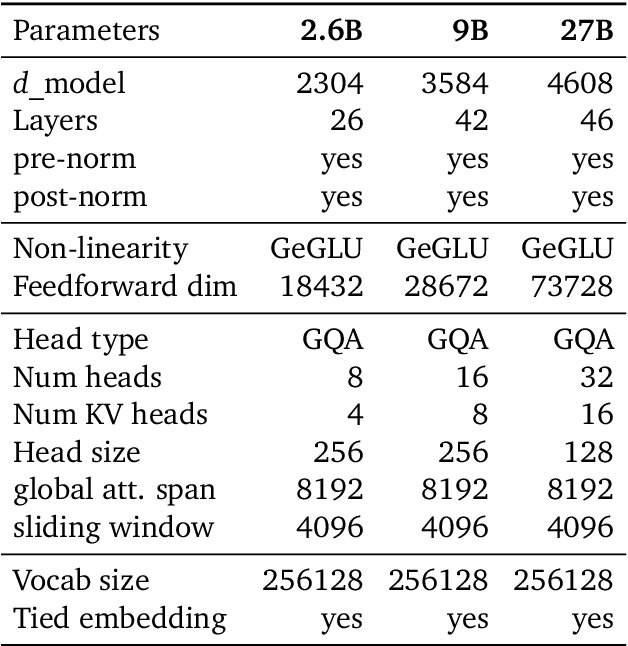
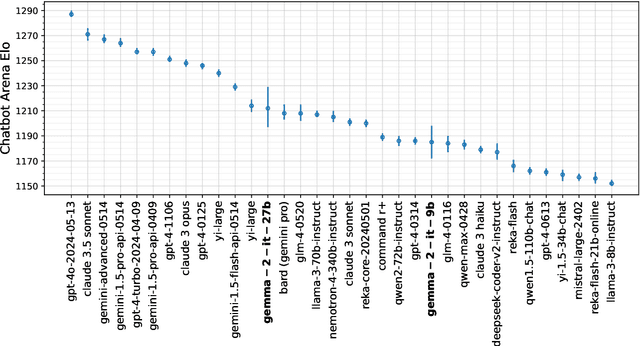
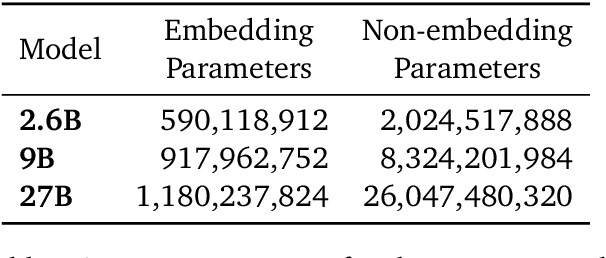
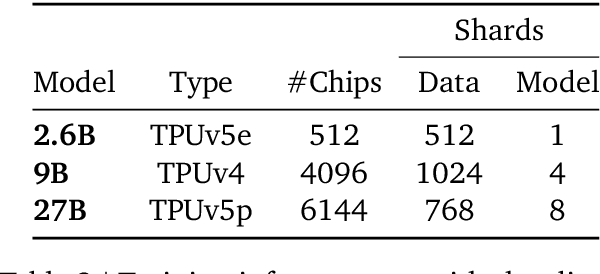
Abstract:In this work, we introduce Gemma 2, a new addition to the Gemma family of lightweight, state-of-the-art open models, ranging in scale from 2 billion to 27 billion parameters. In this new version, we apply several known technical modifications to the Transformer architecture, such as interleaving local-global attentions (Beltagy et al., 2020a) and group-query attention (Ainslie et al., 2023). We also train the 2B and 9B models with knowledge distillation (Hinton et al., 2015) instead of next token prediction. The resulting models deliver the best performance for their size, and even offer competitive alternatives to models that are 2-3 times bigger. We release all our models to the community.
Conditioned Language Policy: A General Framework for Steerable Multi-Objective Finetuning
Jul 22, 2024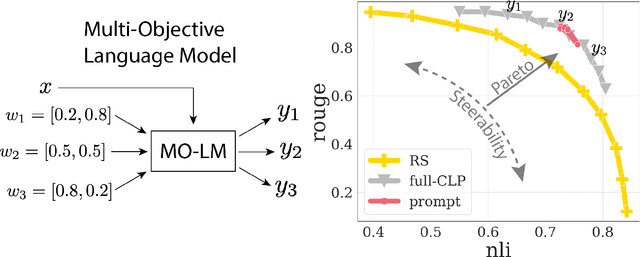
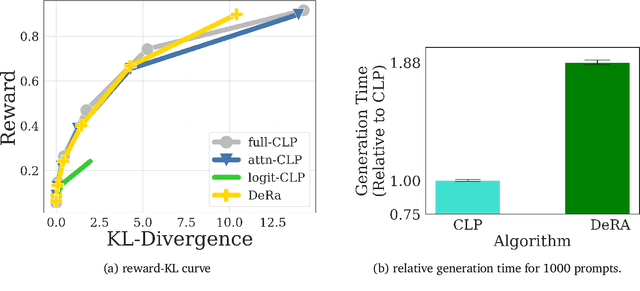
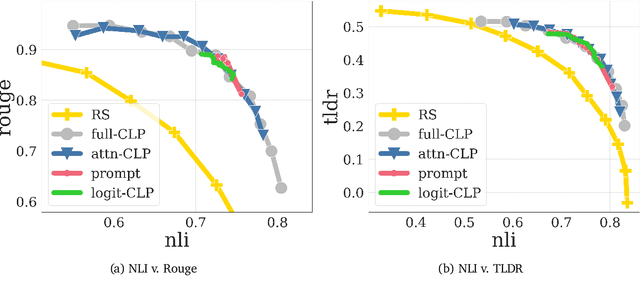
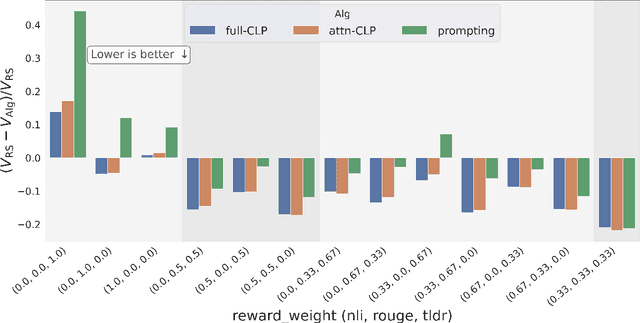
Abstract:Reward-based finetuning is crucial for aligning language policies with intended behaviors (e.g., creativity and safety). A key challenge here is to develop steerable language models that trade-off multiple (conflicting) objectives in a flexible and efficient manner. This paper presents Conditioned Language Policy (CLP), a general framework for finetuning language models on multiple objectives. Building on techniques from multi-task training and parameter-efficient finetuning, CLP can learn steerable models that effectively trade-off conflicting objectives at inference time. Notably, this does not require training or maintaining multiple models to achieve different trade-offs between the objectives. Through an extensive set of experiments and ablations, we show that the CLP framework learns steerable models that outperform and Pareto-dominate the current state-of-the-art approaches for multi-objective finetuning.
BOND: Aligning LLMs with Best-of-N Distillation
Jul 19, 2024


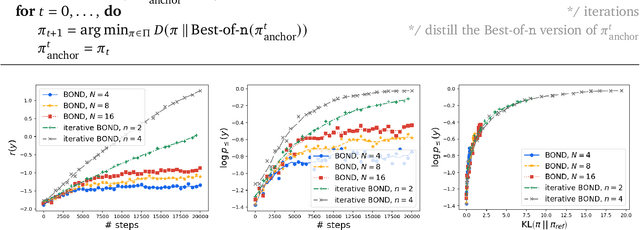
Abstract:Reinforcement learning from human feedback (RLHF) is a key driver of quality and safety in state-of-the-art large language models. Yet, a surprisingly simple and strong inference-time strategy is Best-of-N sampling that selects the best generation among N candidates. In this paper, we propose Best-of-N Distillation (BOND), a novel RLHF algorithm that seeks to emulate Best-of-N but without its significant computational overhead at inference time. Specifically, BOND is a distribution matching algorithm that forces the distribution of generations from the policy to get closer to the Best-of-N distribution. We use the Jeffreys divergence (a linear combination of forward and backward KL) to balance between mode-covering and mode-seeking behavior, and derive an iterative formulation that utilizes a moving anchor for efficiency. We demonstrate the effectiveness of our approach and several design choices through experiments on abstractive summarization and Gemma models. Aligning Gemma policies with BOND outperforms other RLHF algorithms by improving results on several benchmarks.
WARP: On the Benefits of Weight Averaged Rewarded Policies
Jun 24, 2024



Abstract:Reinforcement learning from human feedback (RLHF) aligns large language models (LLMs) by encouraging their generations to have high rewards, using a reward model trained on human preferences. To prevent the forgetting of pre-trained knowledge, RLHF usually incorporates a KL regularization; this forces the policy to remain close to its supervised fine-tuned initialization, though it hinders the reward optimization. To tackle the trade-off between KL and reward, in this paper we introduce a novel alignment strategy named Weight Averaged Rewarded Policies (WARP). WARP merges policies in the weight space at three distinct stages. First, it uses the exponential moving average of the policy as a dynamic anchor in the KL regularization. Second, it applies spherical interpolation to merge independently fine-tuned policies into a new enhanced one. Third, it linearly interpolates between this merged model and the initialization, to recover features from pre-training. This procedure is then applied iteratively, with each iteration's final model used as an advanced initialization for the next, progressively refining the KL-reward Pareto front, achieving superior rewards at fixed KL. Experiments with GEMMA policies validate that WARP improves their quality and alignment, outperforming other open-source LLMs.
RecurrentGemma: Moving Past Transformers for Efficient Open Language Models
Apr 11, 2024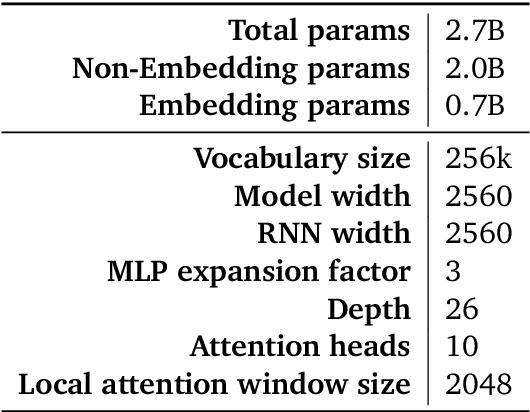
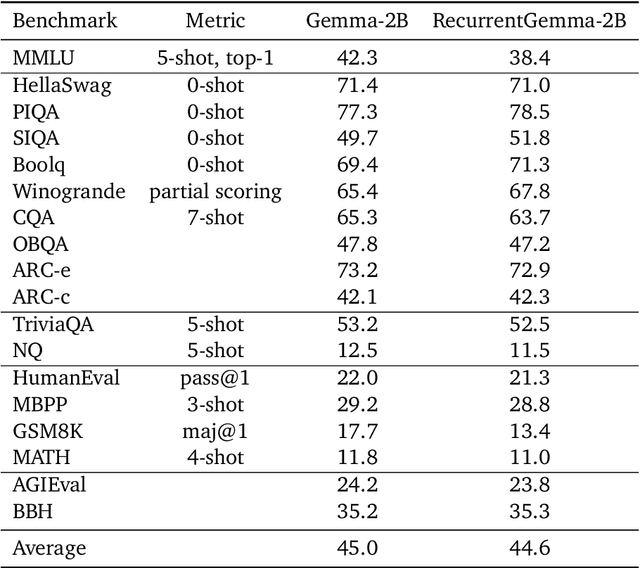
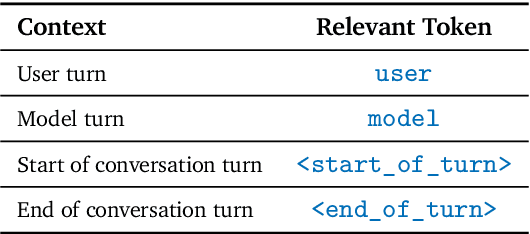
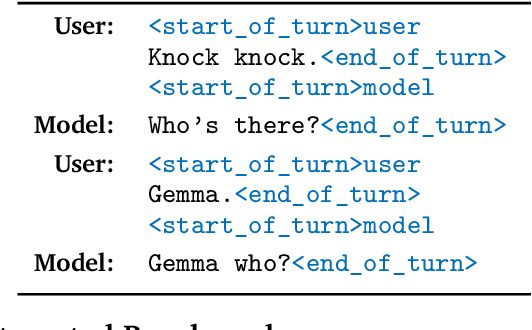
Abstract:We introduce RecurrentGemma, an open language model which uses Google's novel Griffin architecture. Griffin combines linear recurrences with local attention to achieve excellent performance on language. It has a fixed-sized state, which reduces memory use and enables efficient inference on long sequences. We provide a pre-trained model with 2B non-embedding parameters, and an instruction tuned variant. Both models achieve comparable performance to Gemma-2B despite being trained on fewer tokens.
Gemma: Open Models Based on Gemini Research and Technology
Mar 13, 2024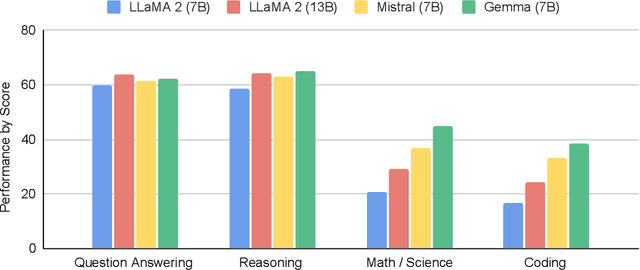
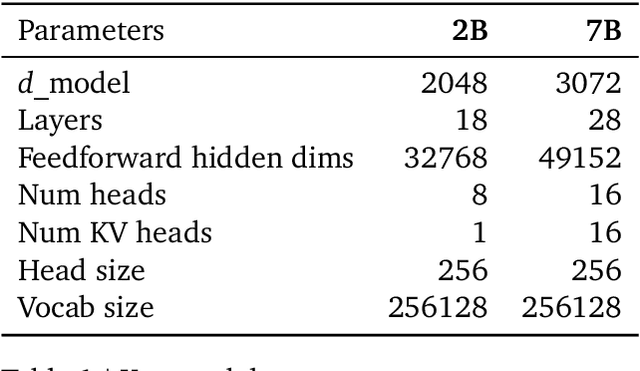
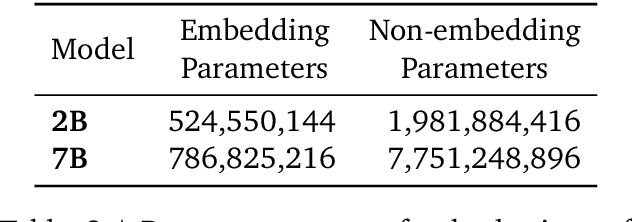
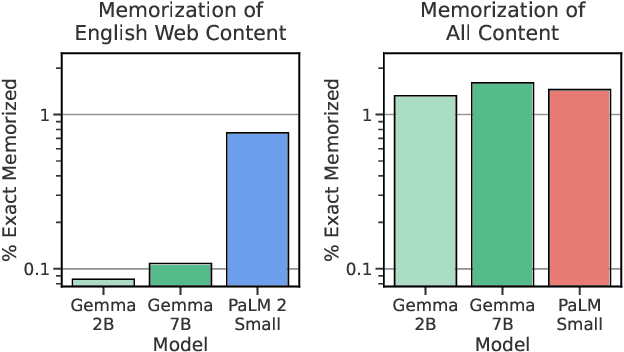
Abstract:This work introduces Gemma, a family of lightweight, state-of-the art open models built from the research and technology used to create Gemini models. Gemma models demonstrate strong performance across academic benchmarks for language understanding, reasoning, and safety. We release two sizes of models (2 billion and 7 billion parameters), and provide both pretrained and fine-tuned checkpoints. Gemma outperforms similarly sized open models on 11 out of 18 text-based tasks, and we present comprehensive evaluations of safety and responsibility aspects of the models, alongside a detailed description of model development. We believe the responsible release of LLMs is critical for improving the safety of frontier models, and for enabling the next wave of LLM innovations.
 Add to Chrome
Add to Chrome Add to Firefox
Add to Firefox Add to Edge
Add to Edge